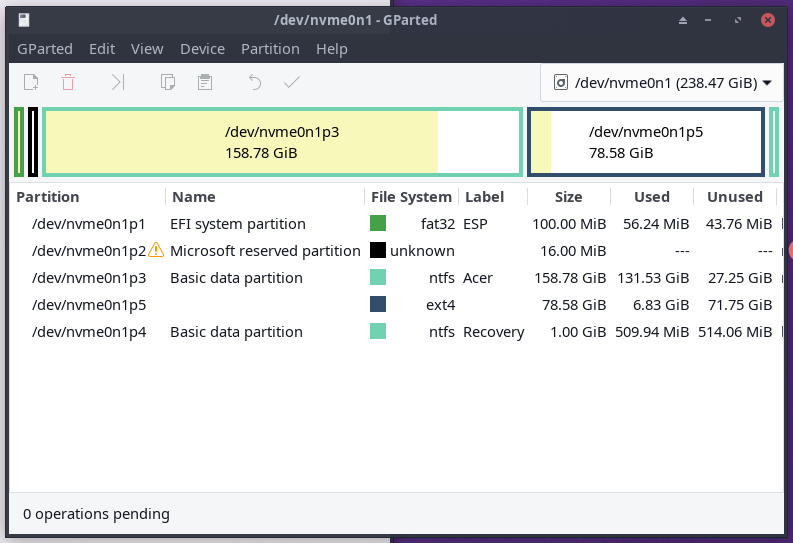It does nothing though. Tried to change boot order, verified running efibootmgr again, but as soon as I shutdown and turn on, same problem, and when I chroot to see the output of efibootmgr, it is as if I changed nothing.
How are you changing the boot order
efibootmgr
sudo efibootmgr -o 0005,0009,0000,000A,0001,0002,0003,0004,0006,0008
Not sure why that won’t change it? If it were me i would remove the following entries first. See if that works?
0002, 0003, 0008, 000A
Then run efibootmgr.
Tried, works until I shut down, then it kind of resets, no idea why.
Well if it’s a fresh install what you could do is reinstall it but this time i would use manual partitioning in the installer. You can use the partition that EOS is installed on and you would have to select the windows /efi partition and don’t format it but use the edit to set it & to flag it as /boot.
Edit: It will show a check box on the windows /efi to not format it.
With manual partitioning, is it enough to set the esp as /boot mount point, and the enOS partition as /root? Would I have to dk anything else? I did the automatic thing because I was unsure on how to correctly do it.
Yes you can set the whole partition as root and flag it as such and then select the windows /efi and edit but do not format it and set it as /boot/efi /boot. Not sure if it has both?
Edit: You can always add a swap file after the fact if needed, Or you could create a swap partition on the existing if you redo it all.
It might be worth resetting the BIOS/UEFI back to factory defaults, then repairing GRUB. (Windows will still appear in the UEFI boot loader because it’s Windows.)
Done. Same result.
You missed this.
It is supposed to be the solution to those bad firmware that won’t/can’t change the default boot (because of winOS…). That’s why you were advised(?) from Manjaro to replace the Windows UEFI entry to point to Manjaro efi file (or do they do it automatically with Calamares now??).
Using the --removable parameter with grub installation command, grub efi file is copied to the default UEFI boot entry (like on removable drives installations), which is also suggested in Archwiki as one of the workarounds.
Just read about grub troubleshooting in the Book (I posted the link in my post…).
Is the hardware stolen? ![]()
Isn’t there any vendor website with the user manuals? (not that it may have useful info, but going to the manual should become a habit to everyone IMHO ![]() )
)
I am trying that right now.
The hardware wasn’t stolen, obviously, but it was a pre-built I purchased from an electronics chain store here, and first of all it came with no manuals inside the box, and second of all, I can find nothing online, aside from some simple “Press this button to turn the pc on”.
Here I am documenting every single step I am taking.
First of all, this is my drive:

where the p1 is the efi partition, the p2 and p3 are Windows partitions, and p5 is the EnOS install.
The most recent install I made, I did a manual partitioning, setting the p5 as /, flag root, and the p1 flag boot (without formatting it).
Mounting and chrooting:
mount /dev/nvme0n1p5 /mnt
mount /dev/nvme0n1p1 /mnt/boot/efi
arch-chroot /mnt
As described by the Arch Wiki link, I proceed with the grub installation:
[root@EndeavourOS /] grub-install --target=x86_64-efi --efi-directory=/boot/efi --bootloader-id=EndeavourOS-grub --removable
Installing for x86_64-efi platform.
Installation finished. No error reported.
Then, the config:
[root@EndeavourOS /] grub-mkconfig -o /boot/grub/grub.cfg
Generating grub configuration file ...
Found theme: /boot/grub/themes/EndeavourOS/theme.txt
Found linux image: /boot/vmlinuz-linux
Found initrd image: /boot/amd-ucode.img /boot/initramfs-linux.img
Found fallback initrd image(s) in /boot: amd-ucode.img initramfs-linux-fallback.img
Warning: os-prober will be executed to detect other bootable partitions.
Its output will be used to detect bootable binaries on them and create new boot entries.
grub-probe: error: cannot find a GRUB drive for /dev/sdb1. Check your device.map.
Found Windows Boot Manager on /dev/nvme0n1p1@/EFI/Microsoft/Boot/bootmgfw.efi
Adding boot menu entry for UEFI Firmware Settings ...
done
Then I exit, umount, and shutdown.
Same result.
What shows your current:
efibootmgr -v
now?
[root@EndeavourOS /]# efibootmgr -v
BootCurrent: 0009
Timeout: 0 seconds
BootOrder: 0009,0000,000A,0001,0002,0003,0004,0005,0006,0007,0008
Boot0000* Windows Boot Manager HD(1,GPT,df8fcd65-e20f-4b8b-9840-3cbae8d2ea59,0x800,0x32000)/File(\efi\Manjaro\grubx64.efi)WINDOWS.........x...B.C.D.O.B.J.E.C.T.=.{.9.d.e.a.8.6.2.c.-.5.c.d.d.-.4.e.7.0.-.a.c.c.1.-.f.3.2.b.3.4.4.d.4.7.9.5.}...&................
Boot0001 rEFInd Boot Manager VenHw(99e275e7-75a0-4b37-a2e6-c5385e6c00cb)
Boot0002 rEFInd Boot Manager VenHw(99e275e7-75a0-4b37-a2e6-c5385e6c00cb)
Boot0003 Manjaro VenHw(99e275e7-75a0-4b37-a2e6-c5385e6c00cb)
Boot0004 endeavouros VenHw(99e275e7-75a0-4b37-a2e6-c5385e6c00cb)
Boot0005 EndeavourOS-grub VenHw(99e275e7-75a0-4b37-a2e6-c5385e6c00cb)
Boot0006 endeavouros-1076 VenHw(99e275e7-75a0-4b37-a2e6-c5385e6c00cb)
Boot0007 endeavouros-7345 VenHw(99e275e7-75a0-4b37-a2e6-c5385e6c00cb)
Boot0008 rEFInd Boot Manager VenHw(99e275e7-75a0-4b37-a2e6-c5385e6c00cb)
Boot0009* UEFI: Lexar USB Flash Drive 1100 PciRoot(0x0)/Pci(0x1,0x2)/Pci(0x0,0x0)/USB(6,0)/CDROM(1,0x35e500,0x32298)..BO
Boot000A* UEFI: Lexar USB Flash Drive 1100, Partition 2 PciRoot(0x0)/Pci(0x1,0x2)/Pci(0x0,0x0)/USB(6,0)/HD(2,MBR,0x49c1b403,0x35e500,0x32000)..BO
At a glance, that looks like exactly the same as before.
It’s quite strange why the changes won’t get “registered”.
This is a wild guess, but I wonder if this might be one of those failing CMOS battery occasions. See this topic for example:
You might want to investigate it further perhaps.
Maybe clear the nvram of all the entries.
sudo rm /sys/firmware/efi/efivars/*
Should I run that whilst chrooted? And then?
Anyway, I managed to boot into a Mint live, which allowed me to run boot-repair, but even that one failed.
It managed to make my error different, in the grub_rescue, saying a normal.mod file was not found, instead of grub_calloc, but then again, as soon as I either try to grub-install or reinstall the distro altogether, back to the grub_calloc.
I take it you have secure boot turned off? Not sure why it won’t write the file to the Windows /efi? Either it’s too small or Nvram is full? It’s obvious it’s creating the entry when you reinstalled grub as it’s listed boot 0007.
But the form seems to be defect as it doesn’t point to any file:
Boot0007 endeavouros-7345 VenHw(99e275e7-75a0-4b37-a2e6-c5385e6c00cb)
The normal form would be something like:
Bootxxxx GnuLinuxOS HD(1,GPT,df8fcd65-e20f-4b8b-9840-3cbae8d2ea59,0x800,0x32000)/File(\efi\GnuLinux\grubx64.efi)
![]()